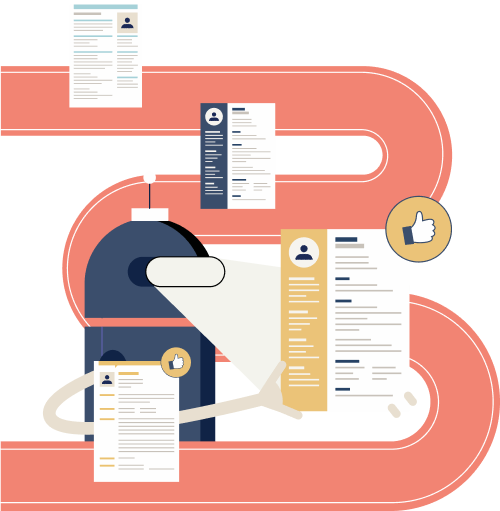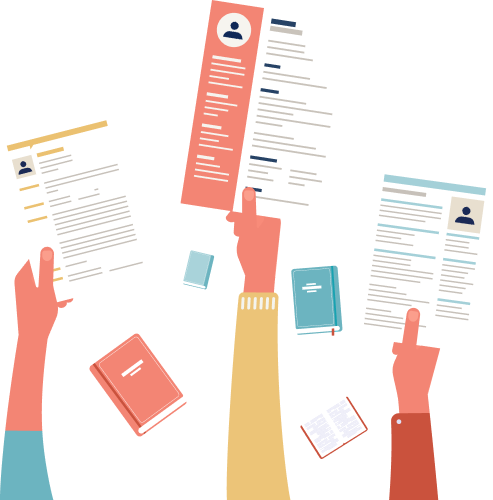How to Write a UCAS Personal Statement for 2026 with Examples
The UCAS personal statement requirements have changed for 2026. Instead of one long essay, you’ll now answer three questions, each designed to help you showcase your passion, academic background, experiences and suitability for the course.


Our customers have been hired by: *Foot Note
The UCAS personal statement is one of the most important elements of your university application. It’s where you get the chance to stand out and showcase why you’re a perfect fit for your chosen course. The format for writing a personal statement has undergone significant changes for 2026 entry, so it’s important to be aware of how these updates affect how you write your statement.
In this blog post, we’ll cover:
- The key changes to the UCAS personal statement format
- How to approach the new UCAS questions
- Expert tips to help you write a UCAS personal statement
- A UCAS personal statement example to guide you
UCAS 2026 personal statement changes
For UCAS personal statement 2026 entry, applicants will no longer submit a single, extended essay. Instead, you’ll answer three unique questions. This change was implemented to give students a more precise structure to follow and to ensure that universities can better assess your motivations, skills, and experiences in a focused way.
Here’s a quick overview of what’s new:
- The UCAS personal statement has now been broken down into three separate questions, each focusing on a specific area of your application.
- Each answer has a minimum character count of 350 characters, and the overall character limit remains at 4,000 characters (including spaces).
- The questions will help you stay focused and ensure you cover the most important points universities want to see.
The new UCAS personal statement layout breaks down the personal statement into more manageable sections, aiming to reduce the stress of writing while giving you a chance to clearly demonstrate your suitability for your chosen course.
The new UCAS personal statement layout: a closer look at the three questions
The new format may sound different, but it’s designed to make presenting your best self easier. Here’s a breakdown of the three questions you’ll need to answer.
Question 1. Why do you want to study this course or subject?
This question gives you the chance to express your passion and motivation for your chosen subject. It’s important to demonstrate that you’ve thought deeply about your decision and that you are truly interested in the field you want to pursue.
Here’s what you should include:
- Your motivations: Why did you choose this course? Did a specific experience, book, or person inspire you? Universities want to see your enthusiasm for the subject, so be authentic and show your passion.
- Your understanding of the subject area: Talk about any super-curricular activities you’ve engaged in (activities outside the classroom that have contributed to your knowledge, like reading academic journals, attending lectures, or participating in online courses).
- Your future goals: Even if you’re not sure what career you want, think about how this course will help you develop the skills necessary for your future ambitions.
Example:
If you’re applying for a Nursing course, you might explain how volunteering at a hospital ignited your passion for healthcare and how the course will equip you with the clinical skills needed to make a difference in patient care.
Question 2. How have your qualifications and studies helped you prepare for this course?
This question focuses on how your academic background has prepared you for the subject. It’s your chance to show how your studies so far are directly relevant to your chosen course.
Here’s what you should include:
- Your relevant qualifications: Think about the subjects you’ve studied that have given you the foundational knowledge for your course. Whether it’s a specific module in school or college, or an online course you’ve completed, mention anything that relates directly to your field of study.
- Transferable skills: Don’t just talk about what you’ve learned in the classroom. Universities also want to see the skills you’ve gained that will help you succeed at university, such as analytical thinking, problem-solving, or research skills.
- Any notable academic achievements: If you’ve won an award, received a certificate, or achieved something significant in your studies, mention this here.
Example:
For a Business degree, you might explain how studying Economics and Mathematics in school has helped you develop strong analytical skills, or how completing a management project as part of your A-levels helped you gain practical experience in leadership.
Question 3. What else have you done to prepare outside of education, and why are these experiences useful?
In this section, you get to talk about anything you’ve done outside of your formal education that shows you’re ready for university. This could include work experience, volunteering, or any other activities that have helped you build skills relevant to your course.
Here’s what you should include:
- Work experience or volunteering: Have you worked or volunteered in a role that gave you hands-on experience in your chosen field? Explain how these experiences helped you develop important skills, like communication, teamwork, or time management.
- Personal life experiences: Think about any personal challenges or responsibilities you’ve taken that have helped you grow. For example, caring for a family member may have developed your resilience, empathy, and organisational skills.
- Hobbies and extracurricular activities: Did you participate in any clubs or sports that helped you build important skills? Maybe you volunteered at a summer school or attended extra-curricular workshops to enhance your knowledge.
- Post-education activities (for applicants not currently in school): If you’re applying after taking a gap year or working, explain how your activities during this time have prepared you for university.
Example:
If you’re applying for a Psychology course, you could talk about your work experience at a mental health charity, where you gained insight into mental health issues and developed valuable communication and empathy skills.
UCAS Personal statement example for nursing
Use this example as a guide for structuring your own UCAS personal statement. Think of it as a way to inspire your approach, focusing on your personal motivations, experiences, and how they connect to your chosen field of study.
Question 1: Why do you want to study this course or subject?
From a young age, I’ve always been drawn to healthcare and the impact it has on individuals and families. My passion for nursing grew after volunteering at a local care home, where I witnessed first-hand the immense difference compassionate care makes in a patient’s recovery. The ability to comfort, educate, and provide physical and emotional support to those in need became something I truly wanted to dedicate my life to. Nursing offers a unique combination of science, empathy, and critical thinking, all qualities I strive to develop and use daily. I am particularly interested in the variety of specialisms within nursing, from paediatrics to mental health. I look forward to developing the skills necessary to become a well-rounded and effective healthcare professional.
I am motivated by the prospect of helping patients during their most vulnerable moments, and I believe that the nursing profession will allow me to do just that while also providing me with the opportunity to continue learning throughout my career.
Question 2: How have your qualifications and studies helped you prepare for this course?
Throughout my academic studies, I have focused on subjects that directly align with the requirements for Nursing. My GCSEs in Biology and Chemistry sparked an interest in the sciences, while my A-levels in Psychology and Health and Social Care deepened my understanding of human behaviour, mental health, and patient care. These subjects have equipped me with a solid foundation in the biological and psychological aspects of healthcare, which I am eager to build on during my degree.
In addition to my formal education, I have completed online courses in Mental Health Awareness, which have given me essential skills in emergency care and understanding the emotional needs of patients. These qualifications have provided me with practical tools and knowledge that will be invaluable when I start my nursing career.
Question 3: What else have you done to prepare outside of education, and why are these experiences useful?
Beyond my formal studies, I have actively sought out opportunities to gain practical experience in healthcare settings. I volunteered at a local care home for six months, where I assisted with daily activities for elderly residents, helped them with personal care, and supported the nursing team. This experience taught me the importance of patience, communication, and maintaining a respectful and empathetic approach when working with individuals in vulnerable situations.
I also spent a month shadowing a nurse at a local hospital, observing the interactions between nurses and patients, and understanding the demands of the job. During this time, I gained insight into the vital role nurses play in both patient care and hospital operations. I learned how to manage time effectively in a busy ward, prioritise tasks, and communicate with other healthcare professionals.
In addition to these experiences, I have been involved in volunteering at a local charity, where I have organised events and supported fundraising efforts. This has helped me develop leadership, organisational, and teamwork skills, all of which are essential qualities for a nurse.
These activities have not only reinforced my passion for Nursing but also given me a practical understanding of what it takes to succeed in this demanding yet rewarding profession. I am excited to continue building on these experiences in my university studies and future career.
What makes this a good UCAS personal statement
Clear passion and motivation: The statement begins by effectively showcasing a genuine passion for the field of nursing. The applicant clearly articulates why they are drawn to healthcare, with a personal example of volunteering at a care home. This provides depth and shows a true understanding of the profession.
Balanced content across questions: Each of the three questions is answered with equal focus and attention to detail, staying within the character limits while providing meaningful content. The first question explores the applicant’s motivations, the second details their academic qualifications and relevant skills, and the third highlights practical experience gained outside of formal education.
Relevant academic background: The applicant highlights subjects like Biology, Chemistry, Psychology, and Health and Social Care, which directly relate to the study of nursing. This gives the admissions team confidence in their academic preparedness for the course.
Strong evidence of real-world experience: The personal statement includes solid evidence of real-world experience, such as volunteering at a care home, shadowing a nurse, and taking additional online courses. These examples show initiative, practical skills, and a genuine commitment to the nursing field.
Well-rounded approach: The statement demonstrates not only academic readiness but also the compassionate qualities necessary for a career in nursing. This includes patience, communication, teamwork, and leadership skills, all essential for professional success. Stays within character limits: The statement stays within the UCAS character limits (including spaces) for each question while ensuring enough content is provided. This balance ensures the statement is both concise and comprehensive, making it easy for admissions officers to review.
UCAS personal statement word limit
One of the most important aspects of writing a UCAS personal statement is staying within the word limit. The UCAS personal statement word limit is 4,000 characters (including spaces), which is around 500-600 words. While the UCAS personal statement length remains the same, the new format with three questions should help you stay within the required character limit.
UCAS personal statement character limit
Each of the three sections has a minimum character count of 350 characters, but remember that your total character count cannot exceed 4,000 characters. Use the character counter provided by UCAS to keep track of your progress as you write.
Don’t leave your UCAS personal statement preparation until the last minute – start early to give yourself ample time to gather ideas and seek feedback. Our cover letter guide can help you understand the best approach to highlighting your strengths and presenting yourself in the most compelling way.
Writing a UCAS personal statement for Masters
If you’re applying for a Master’s degree or further education, the general principles of writing a personal statement remain the same. You’ll want to highlight your more advanced experiences and achievements, focusing on your academic background, relevant work experience, and how these have prepared you for the demands of further study.
In addition to your university personal statement, when applying for a Master’s degree, you will also need to provide a CV. This is an essential part of your application, giving the university insight into your professional background, skills, and achievements. If you’re unsure how to create a strong CV, we’ve got you covered with our CV examples and CV writing guide.
FAQs for the new UCAS personal statement
What are the new UCAS personal statement changes for 2026 entry?
For 2026 entry, UCAS has introduced a new format. Instead of a single essay, your personal statement will now consist of three distinct questions. These questions focus on your motivations, academic preparation, and experiences outside of formal education. Each section has a minimum character count, and you’ll need to stay within the overall character limit of 4,000 characters (including spaces).
What should I include in my UCAS personal statement?
Your UCAS personal statement should focus on three main areas:
- Motivation: Why do you want to study this subject?
- Academic preparation: How have your qualifications and studies prepared you for the course?
- Relevant experiences: What have you done outside of formal education to prepare for this course?
Be sure to include concrete examples from your life to demonstrate your passion, skills, and knowledge.
Is there a UCAS personal statement character limit?
Yes, the UCAS personal statement word limit is 4,000 characters (including spaces), which is approximately 500-600 words. Each answer has a minimum character count of 350 characters, and the overall character limit remains the same as the old format, with 4,000 characters.
How do I stay within the character limit?
The UCAS personal statement has a strict character limit of 4,000 characters (including spaces). This means you need to be concise and to the point. Here are some tips to help stay within the limit:
- Plan ahead: Outline what you want to include before you start writing.
- Be selective: Choose only the most relevant experiences and achievements.
- Use concise language: Avoid unnecessary words and be direct with your points.
- Check your character count regularly to ensure you’re on track.
Can I write my personal statement in the third person?
No, your personal statement should always be written in the first person (“I”). This allows you to speak directly about your motivations, achievements, and experiences, making your statement feel more personal and engaging.
What if I’ve been out of education for a while?
If you’ve taken a break from formal education, it’s important to explain what you’ve been doing during this time. Include any work experience, volunteering, or self-study you’ve undertaken to demonstrate that you’ve continued developing relevant skills and knowledge. These experiences are valuable and can show your commitment and growth.
Should I mention my grades in the personal statement?
While it’s important to demonstrate your academic capabilities, don’t focus too much on your grades in your personal statement, as these will be detailed elsewhere in your UCAS application. Instead, highlight how your studies have prepared you for the course and discuss relevant skills, coursework, or achievements outside of your grades that make you a strong candidate.
Do I need a CV for my UCAS application?
While a CV is not a mandatory part of your undergraduate UCAS application, it is a useful addition, especially when applying for postgraduate courses. If you are applying for a Master’s degree, many universities will require a CV as part of the application. You can use our CV Builder to create a professional CV that complements your personal statement and highlights your experience and skills.
Key takeaways
The UCAS personal statement changes for 2026 introduced a new format with three questions, helping applicants stay focused.
The UCAS personal statement word count remains at 4,000 characters, approximately 500-600 words.
Ensure your statement covers your passion for the subject, your academic preparation, and your extracurricular experiences.
Use UCAS personal statement examples for inspiration, but ensure your statement is uniquely yours.
Need help creating a CV for your university application?
If you’re applying for university and need help crafting a professional CV to complement your personal statement, our CV Builder can simplify the process. Whether you’re applying for undergraduate or postgraduate study, having a well-organised CV can make all the difference. Start building your CV today with our simple-to-use tool, and ensure your application stands out.

Andrew Smith
Senior Content Writer
Meet Andrew Smith – an accomplished English copywriter with a strong background in SEO optimisation. Passionate about producing engaging content, Andrew has written across various fields, including health and fitness, security, travel, and tourism.
*The names and logos of the companies referred to above are all trademarks of their respective holders. Unless specifically stated otherwise, such references are not intended to imply any affiliation or association with myperfectCV.










